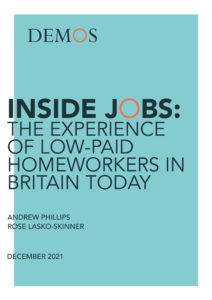A new report by Demos, commissioned and supported by housing association Stonewater, shows that low-paid workers’ experiences of home working have generally been positive, but that there are some challenges that need to be overcome.
The report, published on the 8th December 2021, highlights that the increase in homeworking after the pandemic is largely seen as a positive trend by workers, including low-paid workers, despite mixed messaging from the Government about its future.
With more than half (53%) of workers in the UK doing some work from home at the time of our polling in September, 74% of all homeworkers and 75% of low-paid homeworkers say that homeworking is good for their productivity, and 73% of all homeworkers and 69% of low-paid homeworkers say that working from home is good for their work-life balance.
Stonewater commissioned Demos’ research to identify the barriers and challenges faced by low-paid workers in being able to work from home — including enabling more low-paid workers to experience the benefits of doing so. With the report’s publication, they hope to see more being done to tackle the fact that benefits are not experienced equally — especially hybrid workers who may not see the same benefits as those who work from home all of the time. On average, low-paid homeworkers report their costs increasing by £10 per month (£122 per year) due to homeworking, while high-paid homeworkers report saving £63 per month (£758 per year). However, the situation appears to be worse for some hybrid workers (those who work from home only some of the time): 46% of low-paid hybrid workers are seeing their costs increase. On average, low-paid hybrid workers report spending £39 more per month (£468 per year) due to working from home.
With winter coming and energy bills rising, the fact that 60% of homeworkers say they are spending more on gas and electricity than they would have if they were working in an office suggests that without intervention from government and employers many low-paid homeworkers will face increasing financial pressure in the coming months.
The report sets out several recommendations to government and employers to ensure that low-paid homeworkers do not incur additional costs — including that employers should support their employees with additional energy, internet or equipment costs incurred by having to work from home.
This includes a number of recommendations that would have a particular benefit to the social housing sector:
- Housing providers should review tenancy agreements to ensure that they do not unnecessarily prevent tenants working from home.
- Housing providers should aim to provide high-quality broadband access to tenants, and should consider incorporating broadband access into tenants’ rent payments.
- Housing providers should explore the possibility of providing tenants with co-working spaces for remote working.
- The ongoing review of the Decent Homes Standard should consider issues related to working from home. The revised standard should include broadband connectivity, as recommended by the Centre for Ageing Better’s Good Home Inquiry. The Future Homes Standard should also be reviewed to ensure it is suitable for a future in which homeworking is significantly more common.
- The Department for Work and Pensions should ensure the current housing benefit system supports homeworking by permitting people who are working from home to have an additional bedroom under the Bedroom Standard, without being penalised by the Removal of the Spare Room Subsidy (‘Bedroom Tax’) policy.
- The Department for Work and Pensions and social housing providers should take more of an active role in ensuring claimant awareness of social tariffs in the utilities sector, for example, by notifying those who sign up for Universal Credit of the additional schemes for which they are eligible.
- Local governments should be responsible for establishing remote working strategies to the unique needs of the workforce whether young and urban or older and rural. This should include making adult skills and training available for those who want to retrain for homeworking, alongside considering the development of new remote working hubs and the redesign of existing community spaces to ensure equal access to remote working spaces exists.
 Nicholas Harris, Chief Executive Officer of Stonewater, said: “We recognise that the way we work has shifted for many and it is unlikely that we will ever go back. As a housing association, we want to make sure that we are as responsive as we can be to the future needs of our customers, ensuring the homes we provide are places where customers can thrive.
Nicholas Harris, Chief Executive Officer of Stonewater, said: “We recognise that the way we work has shifted for many and it is unlikely that we will ever go back. As a housing association, we want to make sure that we are as responsive as we can be to the future needs of our customers, ensuring the homes we provide are places where customers can thrive.
“New ways of working present a significant opportunity with where you live becoming less of a factor about the type of work you can access. We are in a unique position to examine the impact of new ways of working, speaking directly to colleagues and customers up and down the country, who may be adjusting to significant changes in the way they work or possibly facing barriers in accessing new opportunities.
“While the shift to homeworking presents many possibilities it also presents challenges, particularly for low-paid employees who might face increased costs and/or lack the provision, connectivity and space to work from home. It is also the case that many low-paid workers will not be able to work from home at the moment. We hope that the recommendations in this report will help to overcome these challenges, making sure everyone has the same opportunity to thrive as we adjust to a new normal.
“Demos’ work will help Stonewater and other employers to support their workers, and we are delighted that this report sets a clear direction for the future of working, and how we can ensure that our customers and those on lower incomes have the opportunity to see the benefits of homeworking that many higher earners have.”
Ben Glover, Deputy Research Director at Demos said: “The Covid-19 pandemic has transformed the way that many of us work. Much of the focus has been on better-paid home workers, overlooking the experiences of low-paid homeworkers who may continue to work from home for the long-term.
Low-paid homeworkers told us they overwhelmingly welcome the shift to remote work. But there are some specific challenges that need addressing: working from home is more likely to cost low-paid workers than others, for example.
What’s more, too few low-paid workers are able to work from home. That’s why we are calling on the government to make employment contracts flexible by default — a first step to widening access to homeworking.”
Key benefits of working from home identified by the report include that:
- Nearly all homeworkers (94%) would prefer to work from home at least some of the time in the future.
- Low earners are just as likely to feel they benefit from working from home as high-paid workers in terms of aspects such as work-life balance, relationships with their family and productivity
- Those who work from home all of the time are saving money on average. Travel, fuel, food and childcare are the most significant drivers of these savings.
However, it also uncovers some important challenges that must be overcome. These include:
Savings and household costs:
While low-paid workers who work from home all of the time are saving about £22 per month (£264/year) on average on their household costs, 46% of low-paid hybrid workers report that their costs are increasing. Low-paid hybrid workers on average are seeing their costs increase by about £39 per month (£468/year). Low-paid hybrid workers report spending more on a range of areas, including food, childcare and gas and electricity.
- By way of comparison, on average high-paid workers (those earning £50,000 or more per year) report saving £63 per month (£758 per year) on household costs as a result of working from home.
- A third of all homeworkers (34%) report working more hours, of which three quarters (76%) report working those extra hours unpaid. 22% of low-paid homeworkers report working more hours, but a majority (64%) of low-paid homeworkers report working those extra hours unpaid.
Uncomfortable working spaces and impact on mental health:
- A fifth of all homeworkers (21%) and of low-paid homeworkers (23%) identify “lack of space” as a challenge when working from home.
- Nearly a fifth of all homeworkers (18%) and of low-paid homeworkers (15%) have experienced challenges as a result of a poor broadband internet connection when working from home,
- One in ten (10%) of non-homeworkers consider lack of workspace and a lack of equipment a barrier to future homeworking.
- A quarter of all homeworkers (25%) and of low-paid homeworkers (28%) say that “feeling lonely” is a challenge for them when working from home.
- A fifth of all homeworkers (20%) and of low-paid homeworkers (20%) say working from home has had a negative impact on their ability to train at work.
The report, ‘Inside Jobs: The experience of low-paid homeworkers in Britain today’, by Andrew Phillips (Demos), is available to download here https://demos.co.uk/project/inside-jobs/.









